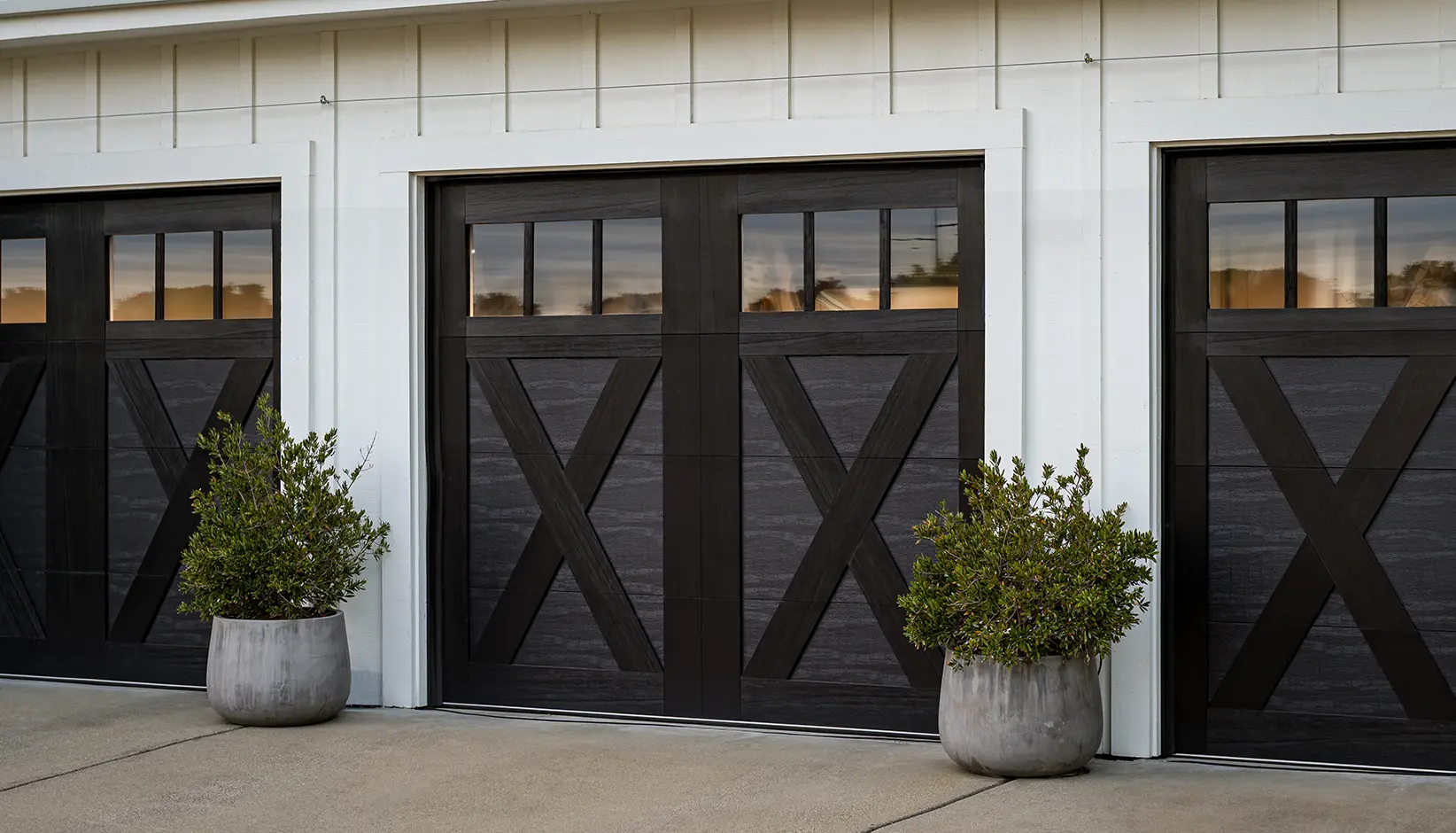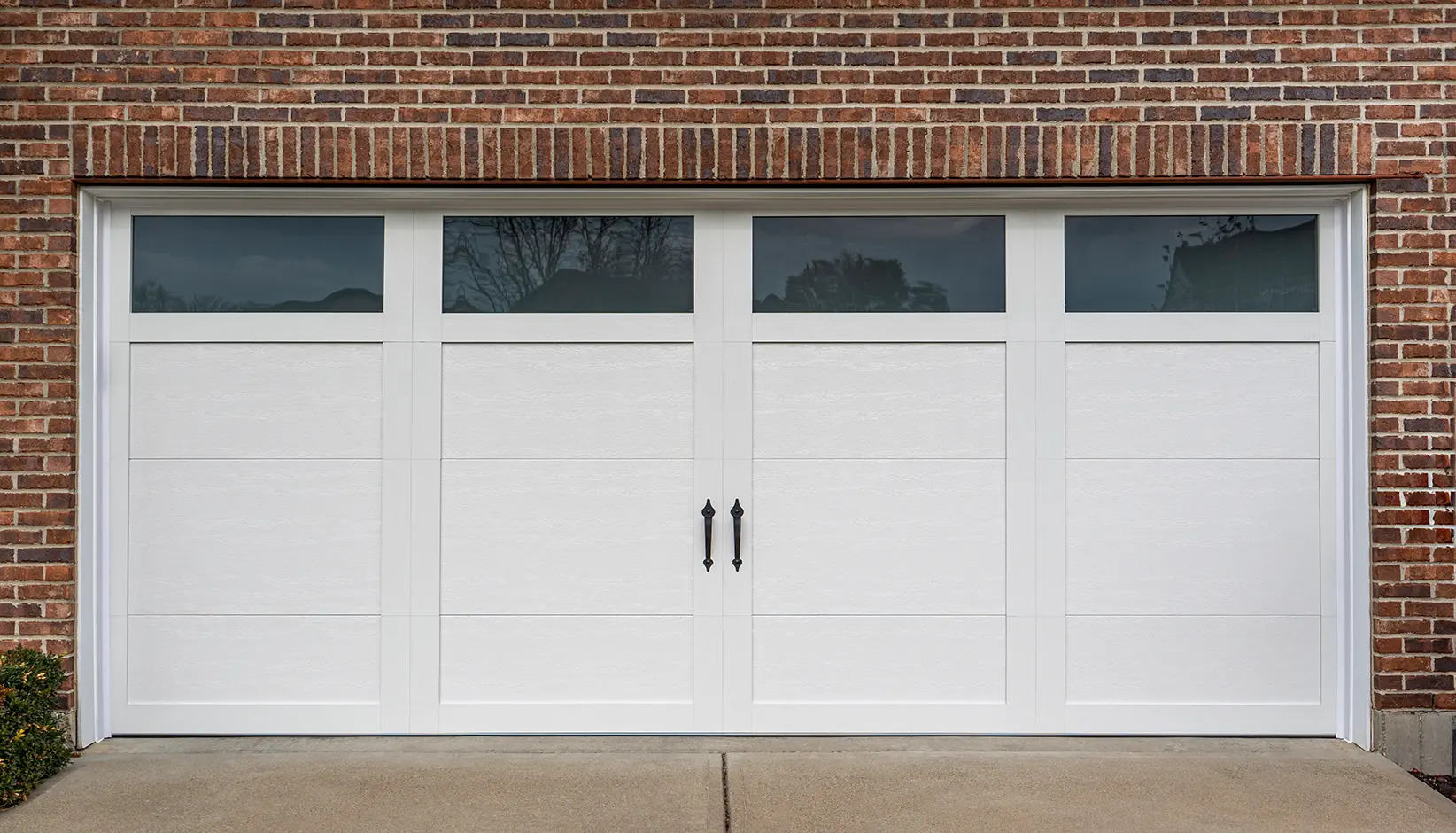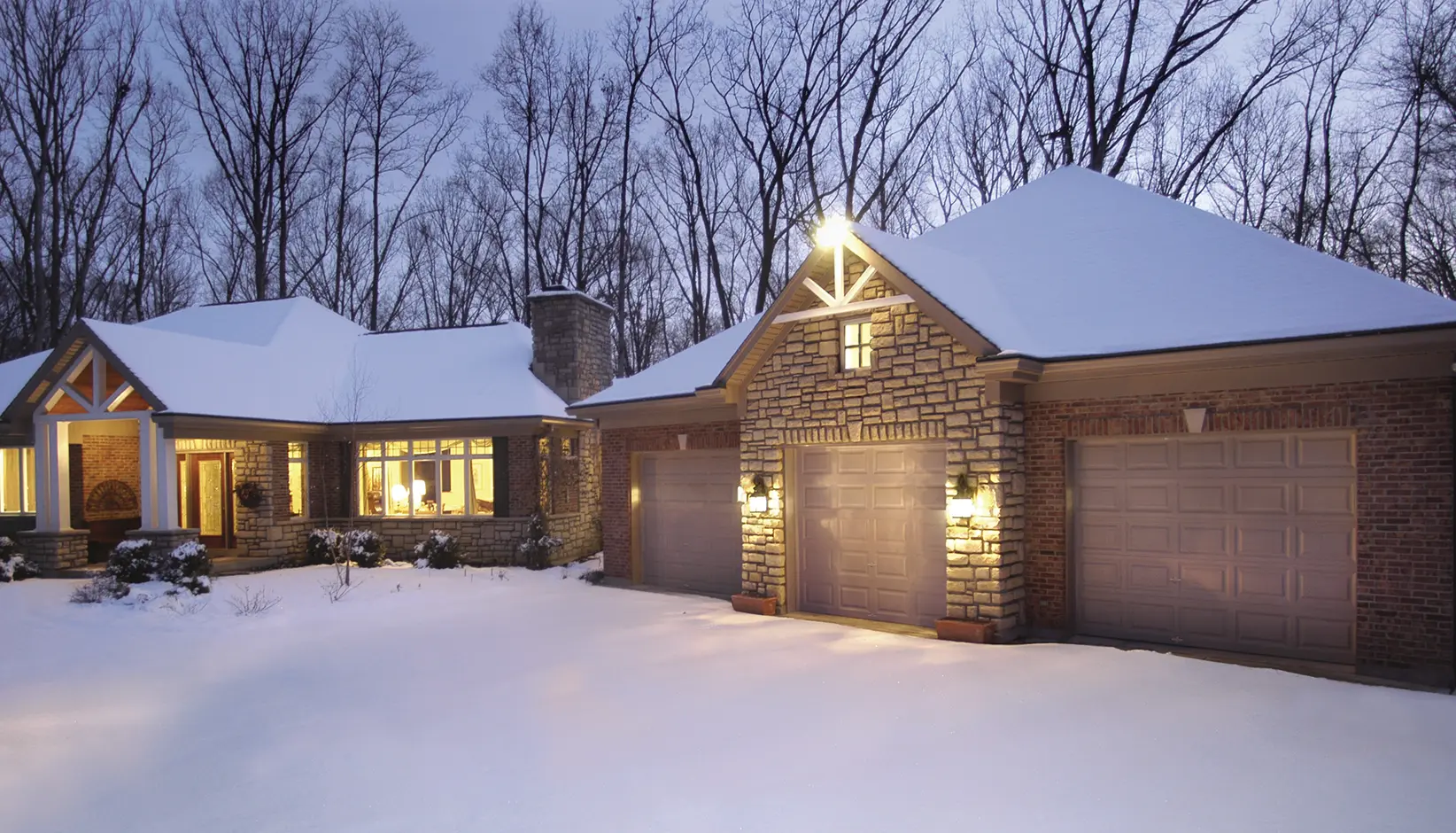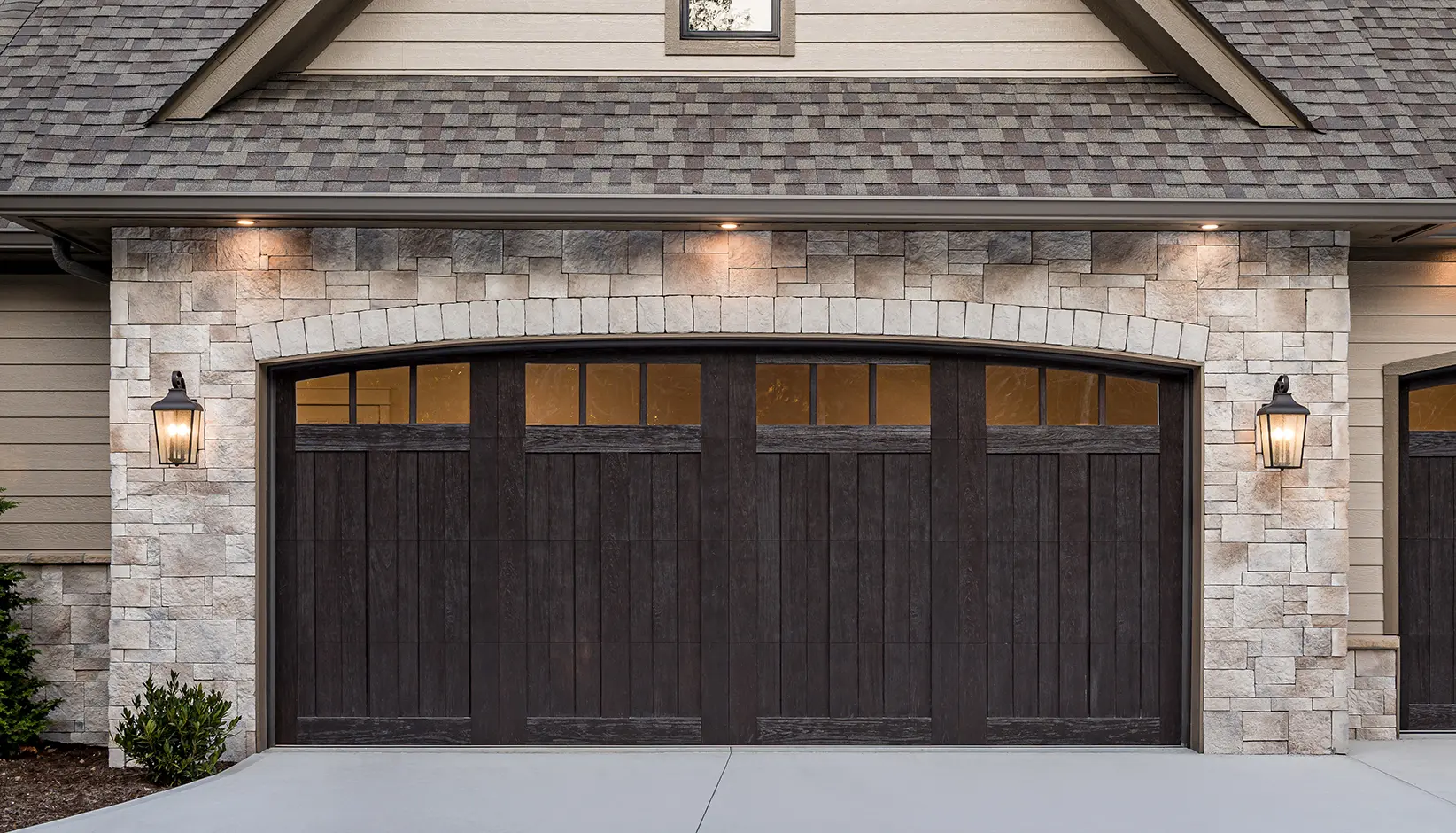Insulated vs. Non-Insulated Garage Doors
Stepping into your garage can sometimes feel like crossing into a different climate zone—sweltering in the summer, bone-chilling in winter. These extremes can affect everything from how you use the space to what you pay on your energy bill. For many homeowners, the choice between insulated garage doors and non-insulated garage doors comes down to balancing garage door cost, comfort, and the way the garage fits into daily life. The right decision can mean a more useful, energy-smart, and enjoyable space year-round. In this article, we’ll review the pros and cons, so you’ll have what you need to compare garage door insulation options and pick the best fit for your needs.
Understanding the Basics
When comparing insulated garage doors and non-insulated garage doors, it helps to understand how each is built and what that means for daily use.
What is an Insulated Garage Door?
An insulated garage door is built with two or more layers (usually steel, aluminum, or wood) that sandwich a layer of insulation material such as polystyrene or polyurethane. These insulation materials slow down heat transfer, helping to block out extreme temperatures and dampen street noise. The result is a sturdier door and quieter and more comfortable garage year-round. One key term you’ll see when looking at garage door insulation is R-value. The higher the R-value, the better the door is at resisting the flow of heat, and the more effective it will be.
What is a Non-Insulated Garage Door?
A non-insulated garage door is constructed from a single layer of material (often steel, aluminum, or wood) without any added insulation. This lack of barrier means heat and cold pass through with little resistance, making the temperature inside the garage much more dependent on what’s happening outside. For homeowners who mainly use the garage for parking and don’t mind temperature swings, this door can get the job done. But in terms of energy-efficient garage doors and comfort, it’s easy to notice the difference that garage door insulation brings.
Benefits of an Insulated Garage Door

Canyon Ridge 4-Layer garage door with Intellicore® insulation
In addition to everyday comfort, choosing an insulated garage door can significantly influence your home’s utility costs, daily convenience, and even long-term upkeep. Some of the benefits of an insulated garage door include:
Enhanced Energy Efficiency
- Insulation works as a buffer, reducing heat transfer between indoors and outdoors.
- Helps keep the garage warmer in winter and cooler in summer.
- Relieves the strain on heating and cooling systems, which is helpful for attached garages.
- Can lead to noticeable energy bill savings, making an energy-efficient garage door a smart investment over time.
Improved Temperature Control
- Maintains a more consistent environment inside the garage.
- Important if the space is used as a workshop, home gym, or storage for temperature-sensitive items such as paint, tools, or electronics.
- Helps extend the lifespan of stored belongings.
- Makes it more comfortable to spend time in the garage throughout the year.
Noise Reduction
- Insulation acts as a sound barrier, cutting down on noise from outside sources like lawn mowers, traffic, or neighborhood activity.
- Reduces noise transmission from inside the garage to the rest of the home.
- Offers a quieter experience, which is nice for homes with bedrooms or living areas adjacent to or above the garage.
Increased Durability
- Insulation reinforces the door, making it more resistant to dents, dings, and damage from regular use.
- Less susceptible to warping or sagging over time.
- Often results in longer lifespans and fewer necessary repairs.
- Can lower garage door maintenance costs for homeowners.
Disadvantages of Insulated Garage Doors
While insulated garage doors offer many advantages, there are a few drawbacks to keep in mind before making your decision.
Higher Upfront Cost
- Insulated garage doors typically come with a higher initial investment compared to non-insulated doors.
- The extra cost can be a deterrent for homeowners prioritizing a lower upfront expense.
Increased Weight
- Adding insulation increases the overall weight of the garage door.
- Heavier doors may require a more powerful garage door opener to operate.
- The extra weight can contribute to increased wear on the opener and other moving parts.
Benefits of Non-Insulated Garage Doors
For homeowners in mild climates or those who use their garage only for parking, non-insulated garage doors can offer several practical advantages, including:
Lower Upfront Cost
- Non-insulated garage doors are generally more affordable, which is appealing for homeowners on a budget.
- Ideal for detached garages or spaces where controlling the temperature isn’t a priority.
Lighter Weight
- The single-layer construction makes these doors lighter than insulated versions.
- Reduced weight puts less strain on garage door openers, hardware, and tracks.
- Easier to lift by hand during manual operation, such as during a power outage.
Simpler Construction and Maintenance
- This door has fewer parts and no insulation to maintain or repair.
- Repairs tend to be simpler and faster, with replacement parts easier to source.
- Lower long-term maintenance requirements make them a good fit for those who want minimal upkeep.
Disadvantages of Non-Insulated Garage Doors
Deciding on non-insulated garage doors may make sense for certain situations, but it’s important to consider some of the trade-offs before making your choice, such as:
Poor Energy Efficiency
- Lack of garage door insulation allows significant heat transfer between indoor and outdoor environments.
- The garage becomes hot in the summer and cold in the winter, especially in areas with extreme temperatures.
- For attached garages, this inefficiency can drive up heating and cooling costs as temperatures in the garage impact adjacent living spaces.
- Non-insulated garage doors aren’t energy efficient.
Limited Temperature Control
- Non-insulated garage doors do little to protect the garage from outdoor weather.
- Sudden temperature fluctuations can make the garage uncomfortable and unsuitable for extended use.
- Belongings like paint, electronics, and sporting equipment may become damaged by temperature extremes.
Minimal Noise Reduction
- Single-layer construction provides almost no sound dampening.
- Activity inside the garage is more likely to be heard throughout the home.
- This can be problematic for garages situated near bedrooms or living spaces.
Reduced Durability
- One-layer doors offer less resistance to dents, dings, and other damage.
- More susceptible to everyday bumps, stray sports balls, or hail.
- Tends to result in a shorter lifespan and the need for more frequent garage door maintenance or repairs compared to insulated models.
Choosing the Right Insulation Material

Canyon Ridge Elements garage door with polystyrene insulation
If you’re leaning toward insulated garage doors, the type of garage door insulation makes a big difference in performance, efficiency, and lifespan.
Polystyrene insulation is often a budget-friendly choice, consisting of rigid foam panels fitted between the layers of the door. It improves R-value beyond a non-insulated garage door but isn’t quite as dense as polyurethane. Expect moderate noise reduction, a step up in comfort, and minimal added weight.
Polyurethane insulation is foam-injected between the door’s layers and expands to fill every gap. This results in higher R-values, greater structural strength, and maximum noise reducing. Polyurethane also excels at resisting dents and impacts, making it a popular upgrade for those seeking the best performance in energy-efficient garage doors.
Intellicore® is Clopay’s advanced polyurethane-based insulation technology. This dense, microcellular foam fills every inch of the door, delivering industry-leading garage door insulation. What sets Intellicore® apart is its ability to create extremely high R-values, with some models reaching up to R-20+. This gives you superior temperature control, impressive noise reduction, and exceptional durability. While Intellicore® comes at a premium, its performance can deliver both energy savings and a longer-lasting door.
Other Insulation Options
There are other materials out there, like fiberglass or radiant barrier panels, but they’re less common in the garage door market and generally don’t match the thermal or structural benefits of polyurethane or Intellicore®.
Factors to Consider When Making Your Decision
A few important factors will help point you toward the garage door option that’s right for your home:
Climate
- In regions with extreme temperatures, garage door insulation helps protect against heat and cold, making the garage more comfortable and reducing the strain on your home’s energy system.
- In moderate climates, you may not need an energy-efficient garage door, but some homeowners still appreciate the added comfort insulation provides.
Garage Usage
- If your garage is used solely for parking, non-insulated garage doors may be sufficient.
- For garages used as workshops, gyms, or hobby spaces, insulation can really improve your comfort.
- Storing temperature-sensitive equipment or supplies? A door with a higher R-value offers extra protection from the elements.
Attachment to Home
- Insulation is especially valuable if your garage is attached to the house, since heat loss or gain through the garage can impact nearby living spaces and raise energy bills.
- An insulated garage door acts as a buffer, helping maintain stable conditions in both the garage and adjoining rooms.
Budget
- Insulated garage doors typically have a higher garage door cost up front, but may provide long-term savings through reduced heating and cooling expenses and fewer maintenance needs.
- You’ll have to consider the initial investment against possible savings over time to determine what works best with your budget.
Noise Sensitivity
- For homes in busy neighborhoods or with living spaces near or above the garage, insulation provides effective noise reduction from both outside and inside the garage.
- If minimizing noise is important to you, insulation delivers significantly better sound control compared to non-insulated garage doors.
Door Material
- The material you select affects how well your door insulates.
- Steel doors are often paired with foam insulation for high R-value performance.
- Wood offers some natural insulating ability but doesn’t match insulated steel or Intellicore® doors for insulation.
- Aluminum is lightweight but should generally be combined with insulation for improved energy efficiency.
See How the Right Garage Door Makes a Difference
Sometimes it’s easiest to make a choice when you can picture it in context. Here are a few common homeowner scenarios that highlight when insulated garage doors or non-insulated garage doors make the most sense.
Example 1: Insulated Garage Door in a Cold Climate

Classic™ Steel garage door
Imagine a homeowner living in Minnesota, where winter temperatures routinely drop well below freezing. Their garage is attached to the house and doubles as a woodworking shop. An insulated garage door with a high R-value helps keep the bitter cold at bay, making it possible to work comfortably on projects even in January. The garage door insulation adds another layer of separation between the workshop and the main house, keeping energy bills lower and ensuring tools and materials aren’t damaged by constant temperature swings.
Example 2: Non-Insulated Garage Door in a Mild Climate
Now consider a homeowner in coastal California, where temperatures rarely get extreme. Their garage is detached and used strictly for parking. For them, non-insulated garage doors are a practical and affordable choice. The moderate weather means heat transfer and garage door insulation aren’t major concerns, and the lower garage door cost leaves money for other home improvements.
Example 3: Home Office or Bonus Room Above the Garage
A family has converted the space above their attached garage into a home office. They notice that during both winter and summer, the room tends to get uncomfortably cold or hot. By installing an insulated garage door with a high R-value, they create a barrier that helps stabilize temperatures in the garage below, which in turn keeps the upstairs living space much more comfortable year-round. The insulation also reduces noise from garage activity, making it easier to focus during work calls.
Cost Breakdown and ROI
When comparing insulated garage doors and non-insulated garage doors, it’s important to evaluate both the initial price and long-term value.
Material and Installation Costs
Non-insulated garage doors are usually less expensive. A standard 8x7 garage door can cost $750 to $1,500, with installation, hardware, and custom features costing extra. Insulated garage doors often start at $900 and can exceed $2,500, especially for premium materials or higher R-value insulation like Clopay’s Intellicore®. While the initial garage door cost is higher, these upgrades add comfort, durability, and energy efficiency.
Energy Savings and ROI
The real difference often shows up over time. Insulated garage doors can help lower energy bills, particularly in extreme climates or for attached garages. Homeowners may see savings that offset the initial investment. Added benefits of an insulated garage door include fewer repairs, less garage door maintenance, and potentially higher resale value.
Choosing between insulated garage doors and non-insulated garage doors involves factors like cost, your climate, garage use, noise, and garage door materials. Consider your priorities: Is the garage simply for parking, or do you need comfort and protection for storage, hobbies, or living space?
Every home is different, so talking with a garage door professional can help you make the best choice. To get started, browse Clopay’s garage door product offerings for a solution that fits your needs.


